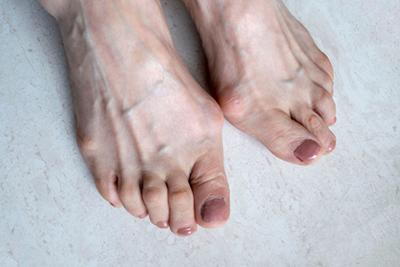What Are Bunions? Causes, Symptoms, and Effective Treatments

What Are Bunions? Causes, Symptoms, and Effective Treatments
- updated: Sep. 20, 2024
Bunions are bony bumps that occur at the base joint of the big toe. They usually grow slowly, but that doesn’t mean their development does not cause pain—especially when wearing certain shoes. Dr. Tin Quach of the Foot Center in Weslaco and McAllen, TX, offers the following guidance for keeping your feet healthy and bunion-free.
Bunions – The Potential Causes
The precise causes of bunions are not completely clear; however, several key factors typically contribute to their development:
- Genetics or hereditary factors
- Ill-fitting shoes
- Structural issues or mechanical problems
- Repetitive use
- Joint stress or overuse
- Foot trauma or injury
- Medical conditions
Bunions – The Symptoms
The intensity of bunions' symptoms varies, with certain individuals experiencing none while others must manage overwhelming discomfort. For some, pain may be constant or only worsened by wearing tight shoes or standing for extended periods.
Common symptoms include the following:
- A visible bump bulging near the big toe’s base joint.
- Swelling, redness, or soreness/pain to the affected joint.
- Pain can be chronic or the type that comes and goes.
- The big toe’s movement becomes restricted/stiff and may turn inward.
- Difficulty wearing certain shoes due to the bunion
Symptoms tend to worsen over time if the bunion progresses and is left untreated.
Preventing and Managing Bunions
Beyond selecting the right shoes with ample space for your toes and avoiding narrow or extremely high-heeled footwear, there are other practical steps to reduce your risk of developing bunions.
- Choose protective shoe padding/cushions for arch support.
Consider OTC orthotics or padded cushions designed for bunions, which offset/redistribute pressure and add support. Additionally, bunion splints may also offer effective help. - Exercise Your Toes.
Stretching/exercising your toes (picking up marbles with toes) can support flexibility and strength. - Maintain a Healthy Weight.
This will decrease the chance of new bunions developing or aggravating existing ones. - Avoid High-Impact Sports.
Specific types of high-impact sports can put undue stress that causes bunions to develop or worsen. - Choose Appropriate Footwear.
Most people managing bunions must adjust the footwear you choose to offer enough room/support.
Note: In specific instances, bunion surgery may be necessary to correct severe conditions that do not respond to other conservative measures.
Contact a Leading Podiatrist Today
If you are experiencing bunion discomfort or pain, contact Dr. Tin Quach or a staff member of the Foot Center in McAllen or Weslaco.
Call (956) 682-4187 for our McAllen office and (956) 969-1063 for our Weslaco office. You can also reach out online.

What Are Bunions? Causes, Symptoms, and Effective Treatments
- updated: Sep. 20, 2024
Bunions are bony bumps that occur at the base joint of the big toe. They usually grow slowly, but that doesn’t mean their development does not cause pain—especially when wearing certain shoes. Dr. Tin Quach of the Foot Center in Weslaco and McAllen, TX, offers the following guidance for keeping your feet healthy and bunion-free.
Bunions – The Potential Causes
The precise causes of bunions are not completely clear; however, several key factors typically contribute to their development:
- Genetics or hereditary factors
- Ill-fitting shoes
- Structural issues or mechanical problems
- Repetitive use
- Joint stress or overuse
- Foot trauma or injury
- Medical conditions
Bunions – The Symptoms
The intensity of bunions' symptoms varies, with certain individuals experiencing none while others must manage overwhelming discomfort. For some, pain may be constant or only worsened by wearing tight shoes or standing for extended periods.
Common symptoms include the following:
- A visible bump bulging near the big toe’s base joint.
- Swelling, redness, or soreness/pain to the affected joint.
- Pain can be chronic or the type that comes and goes.
- The big toe’s movement becomes restricted/stiff and may turn inward.
- Difficulty wearing certain shoes due to the bunion
Symptoms tend to worsen over time if the bunion progresses and is left untreated.
Preventing and Managing Bunions
Beyond selecting the right shoes with ample space for your toes and avoiding narrow or extremely high-heeled footwear, there are other practical steps to reduce your risk of developing bunions.
- Choose protective shoe padding/cushions for arch support.
Consider OTC orthotics or padded cushions designed for bunions, which offset/redistribute pressure and add support. Additionally, bunion splints may also offer effective help. - Exercise Your Toes.
Stretching/exercising your toes (picking up marbles with toes) can support flexibility and strength. - Maintain a Healthy Weight.
This will decrease the chance of new bunions developing or aggravating existing ones. - Avoid High-Impact Sports.
Specific types of high-impact sports can put undue stress that causes bunions to develop or worsen. - Choose Appropriate Footwear.
Most people managing bunions must adjust the footwear you choose to offer enough room/support.
Note: In specific instances, bunion surgery may be necessary to correct severe conditions that do not respond to other conservative measures.
Contact a Leading Podiatrist Today
If you are experiencing bunion discomfort or pain, contact Dr. Tin Quach or a staff member of the Foot Center in McAllen or Weslaco.
Call (956) 682-4187 for our McAllen office and (956) 969-1063 for our Weslaco office. You can also reach out online.
Our Business Hours
McAllen Office
Monday
8:00 am - 5:00 pm
Tuesday
8:00 am - 5:00 pm
Wednesday
8:00 am - 5:00 pm
Thursday
8:00 am - 5:00 pm
Friday
8:00 am - 5:00 pm
Saturday
Closed
Sunday
Closed
Weslaco Office
Monday
8:00 am - 5:00 pm
Tuesday
8:00 am - 5:00 pm
Wednesday
8:00 am - 3:00 pm
Thursday
8:00 am - 5:00 pm
Friday
Closed
Saturday
Closed
Sunday
Closed

